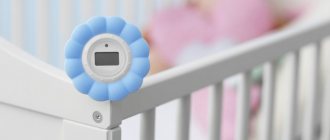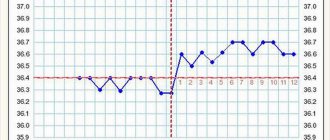Premature babies: signs
There are four degrees of prematurity:
- First. The baby was born at 37 weeks of pregnancy, is 45 centimeters tall and weighs more than two kilograms.
- Second. The child was born at 35 weeks, is 40 centimeters tall and weighs less than two kilograms.
- Third. The baby was born at 31 weeks, measuring up to 35 centimeters and weighing up to one and a half kilograms.
- Fourth. The baby was born at 28 weeks, his height does not exceed 30 centimeters, and his weight is less than one kilogram.
Sometimes the child appears on time, but his body weight does not reach normal. Such a child is also considered premature. The following features will distinguish him from ordinary children:
- slower reaction;
- hypertonicity and hypotonicity;
- lack of pigmentation in the nipple area;
- underdevelopment of the genital organs;
- hypotension;
- frequent breaths and freezing of breath;
- perpendicular arrangement of ribs;
- roundness of the abdomen;
- location of the navel in the groin area;
- underdevelopment of nail plates;
- disproportionate head sizes;
- softness of the skull bones;
- insufficient thermoregulation;
- underdevelopment of the ears;
- a thin layer of subcutaneous fat;
- skin wrinkling;
- quiet voice;
- pink or red skin tone;
- presence of hair fluff.
The presence and severity of these signs depends on the specific week of birth of the baby.
Premature babies: reasons
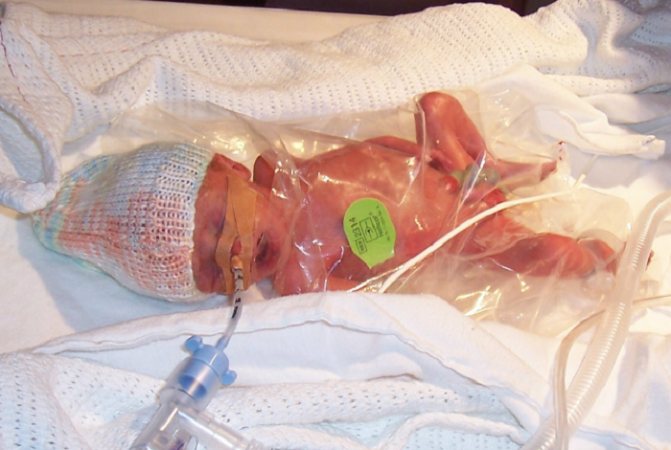
The birth of a baby at the wrong time is caused by many reasons. Firstly, the reason for this is the mother’s illnesses: rheumatism, diabetes, heart disease and some others.
Secondly, premature babies are born to women who were not registered at the antenatal clinic; became pregnant earlier than two years have passed since the previous pregnancy; have had abortions in the past; have diseases of the genitourinary system.
Thirdly, premature birth occurs due to the mother’s age being too early or late, poor nutrition, stressful situations, and reluctance to have a child.
Other prepositions can also be distinguished:
- difficult pregnancy;
- heredity;
- non-compliance with the recommendations of the gynecologist;
- bad habits;
- acute mental shocks;
- carrying twins or triplets;
- presence of harmful factors in the workplace;
- negligence of a pregnant woman;
- fertilization with weak or immature sperm.
Every woman has the power to minimize the risk of having a premature baby. To do this, you should give up bad habits long before the desired pregnancy, lead a healthy lifestyle, get rid of existing ailments, protect yourself from stressful situations, get more positive emotions, and follow the instructions of doctors.
Premature baby, what should you pay attention to?
Premature are considered newborns born between the 28th and 38th weeks of intrauterine development with a weight of 1000 to 2500 grams, a body length of 35 to 45 centimeters and having signs of morphological and functional immaturity.
There are four degrees of premature babies depending on the gestation period and birth weight.
I degree corresponds to 35-37 weeks and body weight from 2001 to 2500 g;
Grade II corresponds to 34-32 weeks and body weight from 1501 to 2000 g;
III degree corresponds to 30-29 weeks and body weight from 1001 to 1500 g;
IV degree corresponds to 28 weeks or less and body weight of 1000 g or less.
Newborns weighing less than one and a half kilograms are considered very premature.
There are many reasons why babies are born prematurely. They can be divided into three main groups:
- socio-economic and demographic. These include the financial situation of the family and living conditions, the nutrition of the pregnant woman, the nature of her work, education, the quality of medical care, the atmosphere in the family, etc.;
- socio-biological. These include the age of the parents, the length of the pregnancy, the interval between births, the outcome of the previous pregnancy, multiple pregnancies or not, climatic and seasonal influences, etc.;
- clinical - infectious and non-infectious diseases of the mother, such as toxicosis of pregnancy, history of abortion, isoserological incompatibility of the blood of the mother and fetus, abnormalities of the female genital organs, neuroendocrine diseases of the mother, chromosomal abnormalities of the child, bad habits of the mother (smoking, alcoholism, drug use), taking certain medications.
Parents of premature babies should understand that the development of their babies is somewhat different from the development of full-term babies, because a child who spent less than the required period in the mother’s body cannot be compared with a child who had a full nine months to grow and develop. In any case, during the first months of life, premature babies may lag behind full-term babies in their development. Don't be afraid of this - they will catch up with everything.
Most premature babies, unlike their full-term counterparts, are weak and quickly get tired while eating, which is why they have to be bottle-fed using a special soft nipple for premature babies, which makes sucking less tiring. In addition, premature babies do not always clearly indicate that they are hungry or tired. Such children must be fed according to the prescribed regimen, without thinking that since they sleep and do not cry, they are well-fed.
Development and characteristics of a premature baby
The development of a premature baby is a natural process, subject to the “program” laid down by nature. It is impossible to force a child to develop faster if he is not yet ready for this. Stimulation will only lead to the fact that both the child and his parents will remain unhappy. And what, in essence, does it matter at what age your baby started walking - one year old or one and a half years old? If you think about it, it doesn’t matter at all - what’s important is that he starts walking. The same goes for all other skills.
At times it may seem that the child is not keeping up or cannot control his movements. This is due to the fact that in premature babies, the development of sensory organs occurs faster than the development of muscle coordination.
A premature baby's reactions can sometimes differ from those of full-term babies, for example, he may suddenly tense his arms or legs or pull them towards him. From time to time, a premature baby may become lethargic. Periods of lethargy are followed by periods of tension. As the child grows, these reflex actions will disappear. Parents can help control their baby's movements by moving the baby slowly and smoothly.
The breathing pattern of a premature baby may also have its own characteristics. Parents should take a closer look at how their child breathes at rest so that they can immediately recognize problems that may arise. To do this, you need to do a little - watch the child’s chest while breathing, count his usual number of respiratory movements per minute, listen to how his normal breathing sounds.
If a full-term baby sleeps up to 22 hours a day, then a premature baby can sleep 24 hours a day. They can’t even, but they should—long, deep sleep is the key to successful development. Some children like to sleep in a dark room in absolute silence, while others may need the soft light of a night light and quiet melodic music - violin, saxophone, piano - to get a good night's sleep. It is best for the child to sleep on his back, on a hard orthopedic mattress.
Crying does not always serve as a signal that the child is hungry, tired, or experiencing some other discomfort. Crying is also a way for newborns to communicate with other people.
In the first months of life, a premature baby should be held as often as possible. This will not spoil him, but will contribute to faster development. For premature babies, tactile sensations are very important, so they should be stroked as often as possible.
It should be borne in mind that premature babies, due to their increased moodiness, can scream and cry for up to six hours a day or even more. Usually, screaming and crying reach their peak between four months and six months of age, and then begin to decrease.
As already mentioned, when experiencing hunger, premature babies, unlike full-term babies, may not signal this by crying. The child's nervous system is not yet mature enough for him to realize that he is hungry. A premature baby should be fed little by little, but often - approximately every 2-3 hours. Little by little, because his stomach is very small. Feeding should take place in a calm environment . Bright lighting and other distractions should be kept to a minimum. It is necessary to place the baby comfortably, supporting his head and neck to make it easier for him to suck.
It is very important to pay attention to physiological functions. Stool frequency and consistency vary greatly from person to person, so parents should know their child's usual, normal stool frequency and consistency in order to promptly recognize abnormalities. In addition to stool, it is important to monitor how often the baby's diaper gets wet. Normally, the number of urinations should not be less than the number of feedings, otherwise we can conclude that the child is experiencing a lack of fluid.
Sterilization of bottles and nipples for premature babies is mandatory. This rule should be strictly followed, especially in the first months of the child’s life.
Due to the fact that premature babies experience an increased need for iron, doctors often prescribe them iron supplements (in drip form). You should not be afraid of such an appointment and begin to think that something is wrong with the child. Everything is fine, it’s just that the iron reserves received from the mother, due to the shortened gestation period, are small and are quickly depleted, which can lead to the development of anemia.
Premature babies, due to insufficiently developed thermoregulation, experience a greater need for warmth, so the temperature in the children's room should be maintained within 23-25 ° C, the child should be dressed warmly, and the duration of bathing should be minimized. During bathing, the water temperature should be at least 38 °C, and in the room where swimming takes place - at least 25 °C. In the first month of life, it is better to bathe premature babies in boiled water.
Electric heating pads and blankets should never be used to warm newborn babies. This is associated with the risk of electrical injury, which at this age is most often fatal. Depending on the degree of prematurity of the baby and the temperature conditions in the room, several ordinary heating pads can be used. The heating pads are wrapped in diapers, towels or special covers and placed at the child’s feet (under the blanket) and on the sides of him (on top of the blanket). The heating pads are placed at a palm's distance from the child. To avoid burns, do not place a heating pad under your child. Also, you can’t put it on top because it can make breathing difficult. It is necessary to change the heating pads one at a time so as not to leave the child without heating even for a short time. In a month or two, thermoregulation will improve and artificial heating can gradually be stopped.
How to dress your baby correctly? Focus on his condition: if the arms and legs are cyanotic and cold to the touch, then this indicates hypothermia, and if the child’s skin is warm and red, then he should be dressed a little lighter.
Premature babies are very sensitive to the sun. Direct sunlight can cause them to burn, so they should be kept in the shade when outdoors. Parents of premature babies need to be very careful when walking, because a sudden change in temperature when leaving the house to go outside can adversely affect the child’s health.
The vaccination calendar for premature babies is compiled individually. True, if the child is healthy and was born with a body weight of more than two kilograms, his vaccination calendar will not differ much from the calendar of full-term children. But children born with a body weight of less than one and a half kilograms are vaccinated only at the end of the first year of life and certainly taking into account their state of health.
Premature children are monitored at the local clinic until they reach the age of seven.
Premature babies: consequences
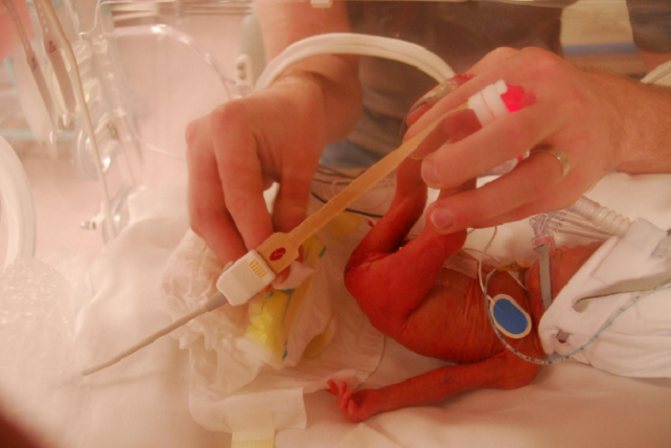
If the baby's weight is insufficient at birth, he will be able to return to normal by one or two years. As for mental development, it will become equal to the level of peers at two to three years old, and sometimes at five to six years old. It all depends on the degree of prematurity, the individual characteristics of the child, the care of the parents and the implementation of special procedures.
However, early birth causes a number of consequences for a person in the future:
- instability of a woman’s menstruation, difficult pregnancy, premature birth;
- dislocations and subluxations, dysplasia, joint diseases;
- seizures, cerebral palsy and other disorders in the functioning of the nervous system;
- VSD;
- reduced immunity, poor health, susceptibility to frequent colds;
- hearing problems;
- poor eyesight;
- diseases of the gastrointestinal tract;
- speech difficulties;
- high risk of cardiovascular diseases.
Due to the high probability of severe consequences, premature babies should be under regular medical supervision and undergo the necessary examinations not only during childhood, but also in adulthood.
Thus, children born prematurely do not necessarily grow up weak and sickly, lagging behind normal babies in psycho-physical development. However, their risk of developing various ailments is much higher than that of others. Therefore, parents should pay more attention to their premature babies, take care of them, perform the exercises recommended by doctors and follow their advice. It is also important to constantly be under medical supervision in order to be able to identify serious diseases in time and begin to fight them.
Features of the development of premature babies by month
Children born prematurely should be under close medical supervision. This is due to the fact that such newborns develop slightly differently than their peers. The monthly development pattern is as follows:
- First. All internal organs and systems of the baby undergo adaptation to the environment in the first four weeks of life. The baby is still weak, his sucking activity is rather weak, and weight gain is slow. After discharge from the maternity hospital, parents should closely monitor the baby and try to protect him from infectious diseases.
- Second. Weight gain accelerates, motor and sucking activity increases. This can be considered a sign that the newborn is getting stronger and on the mend. From the second month, tummy tucks and light massage are allowed.
- Third. At this age, the first grimaces appear. The baby begins to learn to focus on her mother, raises her head, and responds to the touches of loved ones with the help of facial expressions. By three months, the grasping reflex is noticeable. Weight is gaining well. All that the child needs now is care, protection and provision of the right conditions.
- Fourth. The toddler begins to hold his head and makes his first sounds. Regular massage and gymnastics help reduce muscle tone, which is still quite high at this time.
- Fifth. Around the fifth month, the baby pleases mom and dad with his first smile. His interest in the world and objects around him noticeably increases. If the baby hears a sound, he looks in that direction and tries to turn his head.
- Sixth. By the age of six months, toddlers learn to roll over from their tummy to their back and vice versa. The baby already recognizes its relatives well; the so-called “revival complex” appears. Seeing her relatives, the baby waves her arms and legs and smiles.
- Seventh. By this time, the first teeth have already appeared. The baby confidently holds the rattle, smiles, and tries to crawl. All reflexes are quite pronounced.
- Eighth. Now the little one confidently stands on all fours, sways from side to side, turns his head. The desire to communicate with dad, mom and other close people is quite strong. Children of this age love fairy tales, poems, songs and nursery rhymes.
- Ninth. By the age of nine months, the child pronounces the first syllables - “boo-boo”, “ma-ma”, “la-la”. Now the baby is already crawling well or is actively trying to do so. Communication with adults becomes even more active.
- Tenth. The baby stands confidently at the support and can take several side steps near it. Favorite activity is making promises with adults and watching bright objects move.
- Eleventh. By this time, children already know how to sit, stand, take steps near a support, or even independently. Most of the time the toddler crawls. Communication with parents and other loved ones becomes a necessary necessity of life.
- Twelfth. By the age of one, many babies born prematurely take their first steps. At the same time, mental development is slightly delayed and this is considered the norm. If your baby hasn't taken his first steps yet, don't worry. A little more time and effort, and he will definitely succeed.
You might be interested in: How not to snap at your children
You shouldn’t look for various deviations in your baby and get upset if something doesn’t work out for him. During a routine examination, the pediatrician will definitely pay attention if something goes wrong.
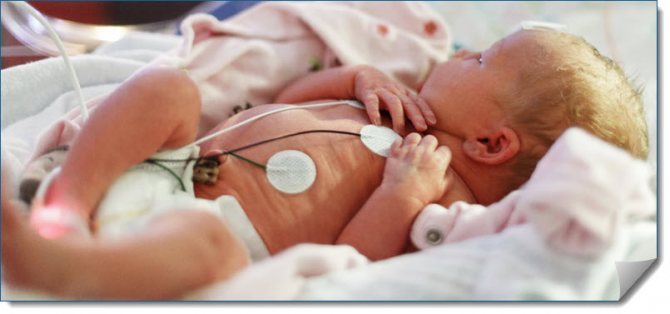
If various alarming signs appear, for example, if the baby stares at the ceiling for a long time, avoids eye contact, or shows aggression, you should definitely inform your doctor about this.
Proper care of premature babies - features and subtleties
Babies who were born prematurely need special care. This applies not only to medical care in the first weeks of life, but also to further stay at home. However, parents should not panic, imagining incredibly complex and specific manipulations. In fact, all parents can provide proper care for premature babies, the features and subtleties of which are described below.
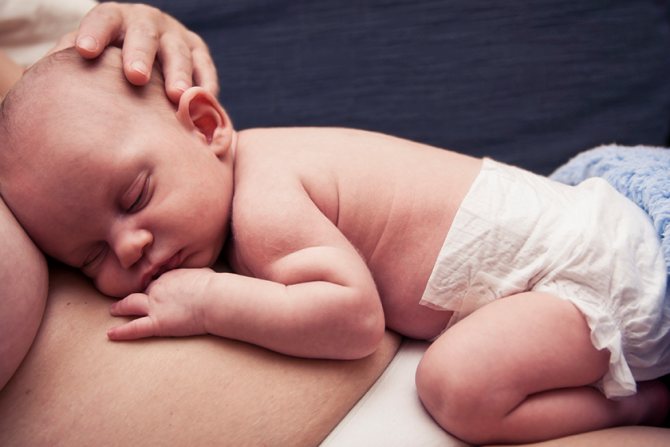
All attention to the temperature regime!
As soon as the baby and mother get home from the hospital, the first thing they have to take care of is maintaining the optimal temperature regime. Due to their low weight and insufficient fat layer, premature babies especially need warmth.
In this matter, pediatricians recommend adhering to the following rules:
- The temperature in the room where the child will be located is from 22 to 25 degrees.
- Near the baby and under his blanket, parents should constantly maintain the temperature in the aisles from 28 to 32 degrees. Rubber heating pads filled with water at a temperature of 60-65 degrees can help in this difficult matter. It is strictly forbidden to use electric heating pads, blankets and other similar products.
- The heating pads are placed on top of the blanket on the sides, at a distance of a palm from the baby, and also at his feet. In this case, such a heat source is pre-wrapped in a diaper. It is prohibited to place heating pads on top of or under the baby, as this can lead to burns and breathing problems.
- Monitor temperature using a thermometer. The regularity of changing water in heating pads is 1.5-2 hours.
- Ventilation of the room in which the child is staying is carried out every 3 hours and lasts at least 20 minutes.
Important! A premature baby should not be left without warmth even for a couple of minutes, as this immediately threatens hypothermia. Parents will need to adhere to such a strict temperature regime for the first month of the baby’s life, after which he will be able to cope with external changes on his own.
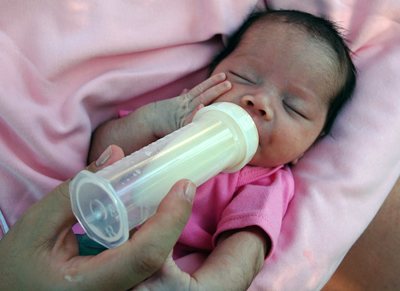
How to organize feeding?
The biggest problem that parents of a premature baby will have to face is related to the child's insufficient or complete absence of sucking reflex. Also, such children are characterized by poor appetite, constant regurgitation, constipation or, on the contrary, diarrhea. All this is due to the immaturity of the gastrointestinal tract.
That is why pediatricians recommend using the following rules in relation to premature babies:
- Provide breastfeeding to the baby. A young mother should think about maintaining lactation while still in the maternity hospital. Good nutrition, lack of stress and good sleep of a woman will provide the baby born prematurely with the most necessary things.
- To prevent the baby from burping after the next meal, it should be done often and in small quantities, reclining. After this, the child should remain in an upright position for 15-20 minutes.
- In case of unstable stool or other problems with the digestive system, it is strictly not recommended to use tummy massage, gas outlet devices (tubes) and enemas.
Important! If problems with the gastrointestinal tract occur too often, accompanied by alarming symptoms, then you should immediately consult a specialist.
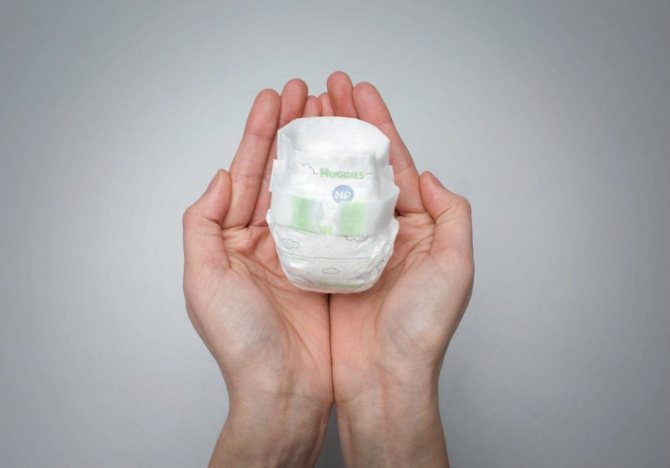
First water procedures - what should they be?
If the baby was born weighing no more than 1800 g, then you will have to give up bathing for 2-3 weeks. Children with greater weight enjoy water procedures already in the first week after arriving from the hospital.
When bathing babies born prematurely, be sure to adhere to the following recommendations:
- Before reaching 3 months, babies should bathe in pre-boiled water, the temperature of which is 38 degrees.
- The room where the procedures will be carried out should be heated to 25 degrees.
- After bathing, you should not immediately transfer the baby to a room with a lower air temperature. Over time, the bathroom door can be left open so that the child can gradually adapt to the new environment.
It is precisely these hygienic procedures that consist of proper care for premature babies, the features and subtleties of which all parents can learn.
Massage – is it possible or not?
Of course, for premature babies, experts have developed special massages and procedures that will help the baby get stronger and master the necessary skills as quickly as possible.
There are some peculiarities in dealing with such babies:
- If a child has muscle hypotonia, then light stroking is suitable for him, which delicately relaxes the muscles.
- After two months of age, such simple manipulations can be varied with light gymnastic exercises. They will help you quickly develop and consolidate motor skills.
- If the baby is already 3-4 months old, then parents can already teach him to turn to his side. The main thing is to do everything carefully and slowly.
Important! The main goal of massage for premature babies is psycho-emotional contact with parents, during which they gain positive emotions and new skills.
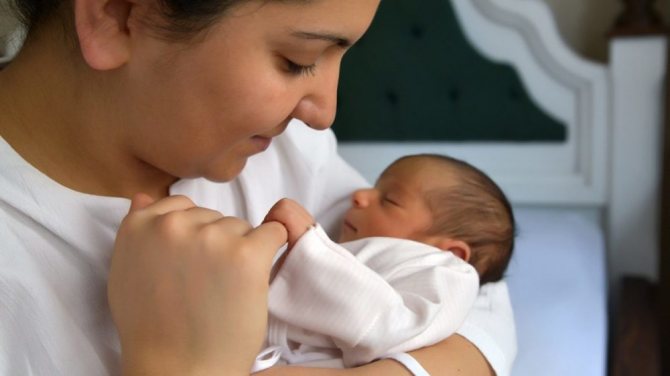
Let's go for a walk - how to make it safe and useful?
As mentioned earlier, temperature changes are contraindicated for premature babies. If you want to go with your dear child into the fresh air as soon as possible, then you will need to follow the following rules:
- The first walk for babies weighing more than 1500 g will take place no earlier than two weeks of age. And this is only provided that it is summer outside and the air temperature is from 26 degrees.
- Going outdoors should begin with 15 minutes of exposure to the open air. Then, gradually adding 20 minutes at a time, the total time reaches 1.5 hours.
- As soon as the child reaches a weight of 2500 g or 1.5 months, he can be taken for walks without fear in the spring-autumn period, when the temperature outside is at least 10 degrees.
- If the mark on the thermometer drops below 8, then they refuse to go for walks. The exception is babies weighing from 2800 g and older than 2 months.
Baby development by month
The development of a premature baby directly depends on the period at which he was born.
From 34 to 37 weeks
Children at this stage of gestation are usually born with a body weight of about 2.5 kg. This degree is considered mild, so the baby practically does not require special care and the use of various treatment methods.
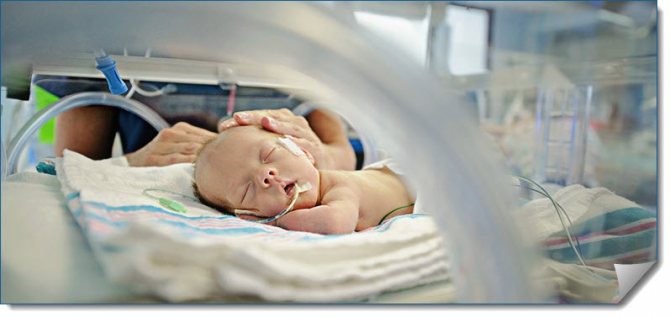
The baby can breathe on his own and is considered fully viable. The exception is when a child is born with any pathologies, he has pathological jaundice, or the baby is injured during childbirth.
From 32 to 34 weeks
Children at this stage are born with a body weight of about 2 kg, often the weight of a newborn is only 1.5 kg. For such babies it is necessary to create the right conditions and careful care. With proper care, the child quickly gains weight and adapts to the conditions of the surrounding world. 2-3 weeks after birth, the baby is quite capable of sucking the breast independently.
From 28 to 30 weeks
A premature baby, who was born between 28 and 30 weeks of gestation, usually weighs no more than 1.5 kilograms. Despite this, thanks to proper medical care, the baby has every chance to survive and by the age of one year is no different from its peers. This is a deep degree of prematurity. At 28–30 weeks, babies are often born with various developmental defects.
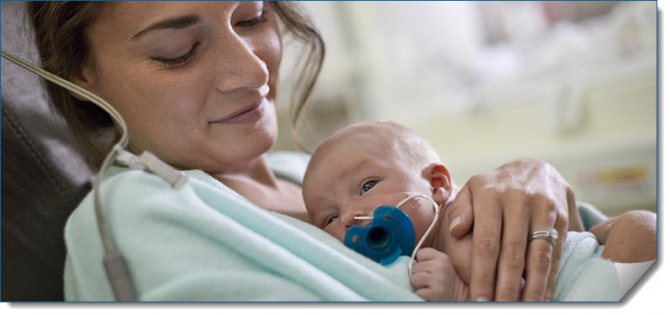
It is possible to save the life of a child born with severe prematurity with the help of an artificial lung ventilation device and the use of various hormonal drugs.
Children born before 28 weeks of pregnancy
The birth of a baby before the 28th week of pregnancy is the most severe, so-called extreme degree of prematurity. The internal organs and systems of a non-born child are not able to function fully, so the struggle for the life of a baby is very difficult. It is worth noting that the percentage of children born with various developmental anomalies and defects at this period is quite high. Often the baby dies in the first hours of life. If the toddler survives, the prognosis for him may be different. From healthy development and full recovery to severe complications and disability.
You might be interested in: What can a 6 month old baby (girl) do?
Under close medical supervision – which specialists should examine the child?
Before reaching school age, premature babies are monitored at the dispensary. For such children, regular visits to the following highly specialized specialists are mandatory:
- Neuropathologist. As a rule, by the age of one year such children almost completely catch up with their peers in development. But, if there are any problems, only a specialist will be able to diagnose them at an early stage and prescribe effective therapy.
- Cardiologist. In addition to consulting a specialist, you will need to regularly undergo ECHO-CG procedures, as well as ECG, which allow you to assess the state of the child’s cardiovascular system.
- As soon as the baby turns 2 weeks old, he will be prescribed vitamin D and a special massage to avoid the development of rickets.
If at first glance everything seems complicated, then after a week of such a specific regime, parents will not even notice their fatigue. After all, every loving mother understands that proper care for premature babies, the features and subtleties of which are described above, will help the precious child grow up healthy and happy!
Caring for an infant in a hospital setting
After birth, a premature baby requires urgent medical attention. Resuscitation measures are often carried out if the baby’s condition requires it. If the lungs do not open, a ventilator is required.
It is important to exclude physical and mental irritants for the child. Blood is drawn and injections are given only when necessary. If a catheter is required, a protective film is first applied to the skin. This usually depends on the degree of prematurity of the baby and his condition.
Using a couveuse
A couvez is a special device in the form of an incubator. It is necessary for nursing premature babies. Externally, such an incubator looks like a transparent container where the baby is placed through special holes. The peculiarity of the incubator is that special microclimatic conditions are maintained inside it, necessary for a baby born prematurely. The air temperature and humidity do not allow the child to overheat or overcool. Through special openings, medical personnel have access to the newborn.
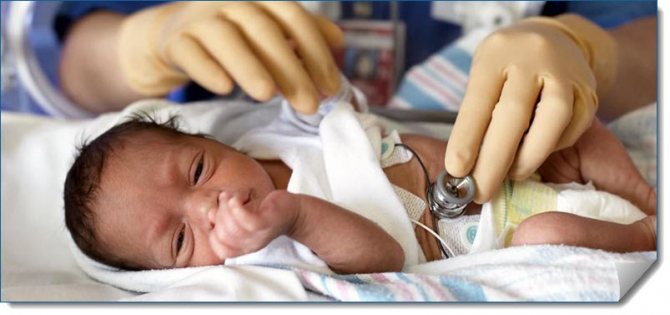
If a baby is born in a maternity hospital without the necessary equipment, it requires immediate transportation to a hospital where all conditions for survival can be created for it. At the same time, the baby is monitored around the clock. Special sensors are attached to his body, which signal in case of respiratory or cardiac arrest.
Expert opinion
Ksenia Dunaeva
User experience expert and comment moderator. Higher medical education and more than 5 years of actual practice.
Ask Ksenia
Children in incubators are fed through a tube. Such equipment is inserted into the stomach through the nose. If the baby's weight is very small, nutrients are introduced into the body through injections. Breastfeeding is allowed after the little one gets a little stronger and is able to suckle on his own.
Care for very premature babies
If a baby is born with a body weight of less than 1 kilogram and 300 grams, doctors use the so-called motor rest tactics. Without urgent need, no medical measures are carried out, since any irritation can only aggravate the baby’s condition.
In most cases, such children are connected to a ventilator. Nutrients to support vital activity are administered by injection or through a tube. When a baby is born weighing less than 500 g, the newborn is required to stay in specialized departments with modern and expensive equipment.
Methods for warming premature babies
The main condition for the survival of babies born earlier than planned is maintaining normal body temperature. Due to the fact that thermoregulation in such babies is often impaired and the risk of hypothermia is very high, warming is required. Various methods are used for this:
- Using a heated mattress. This portable and convenient device can be used in hospital and home settings. This mattress should only be used as prescribed by a doctor. It is important to regularly monitor the baby's body temperature.
- Using a heating pad. The use of a heating pad should only be carried out under the supervision of medical personnel. The water temperature cannot exceed 60C°. In this case, the heating pad is placed under the blanket. During warming, it is very important to monitor the condition of the baby and control its body temperature. Under no circumstances should a baby be placed directly on a heating pad.
- Using thermal protective film. To warm the baby, the film is treated with a disinfectant solution and wrapped in sterile fabric with a natural composition. The baby is wrapped in film for the time prescribed by the doctor. It is strictly forbidden to use such a device at home, as it can overheat the child.
You might be interested in: Development of a child (boy or girl) by month to year
Warming helps the baby maintain the required body temperature.
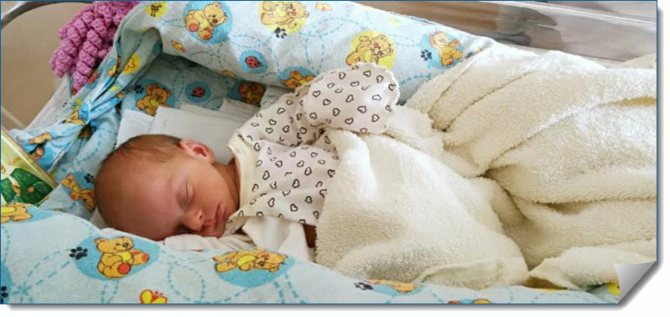
These conditions are close to the mother’s womb, so the baby feels comfortable.
Keeping warm using kangaroo care
Many modern clinics use the so-called kangaroo method to warm premature babies. It involves maintaining the body temperature of the unborn child by being directly close to the mother’s body. This method is possible in the absence of various pathologies in the baby.
The child is completely undressed, placed on the mother’s bare chest and stomach, and wrapped on top with a diaper and blanket. It is in this position that mother and toddler spend most of their time. Hearing mother's breathing and heartbeat, the baby feels good.
The kangaroo care method not only helps to keep the newborn warm, but also promotes its good development. In addition, it promotes good lactation.







